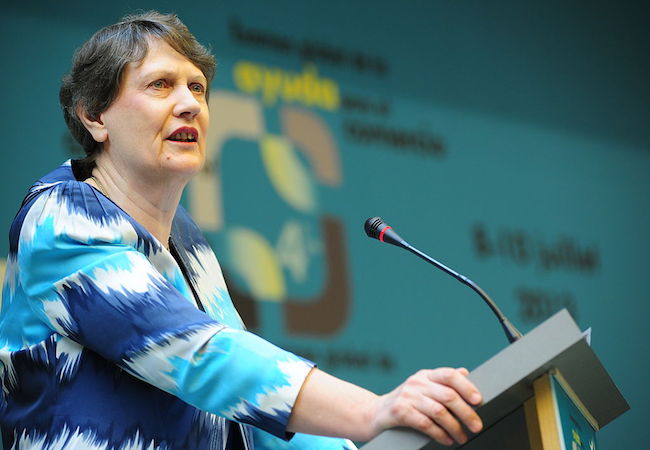
By Geovanny Vicente-Romero
International days celebrating global causes are a new trend, one we have already grown accustomed to embracing. According to the United Nations, the main purpose of such days is to raise awareness, generate support, and call attention to unresolved problems, important and pending issues in our communities. This awareness is intended to encourage governments to enact polices toward achieving a determined goal, or to demonstrate support for citizens to demand the same from their representatives. This kind of awareness is what we need with World Food Day, on October 16. Global food security is a major concern, and one thing leads to the next.
Thus, October 17 marks the International Day for the Eradication of Poverty, celebrated since 1993. However, many wonder, have we reduced poverty? If the answer is no, or the result achieved is limited, then we need to ask: What factors stand in the way of eliminating poverty, and what steps should be taken to do so?
In my quest for these answers, I asked this last question directly to Helen Clark, former Prime Minister of New Zealand for three terms, and past Administrator of the United Nations Development Program (UNDP). Prime Minister Clark, one of the most powerful women in the world according to Forbes, is also known for her run at the United Nations Secretary General. So, I wanted to hear from one of the most decorated women to break the glass ceiling in the global arena about how we can eliminate poverty. Her answer was clear and straightforward as to the steps to be taken. In her Twitter account @HelenClarkNZ tells us, “Use of cash transfers, job creation and free education.”
Use of cash transfers, job creation, free education.
— Helen Clark (@HelenClarkNZ) October 17, 2017
For years, world leaders have met at summits seeking solutions to the problem and have come up with innovative ideas such as changing time zone to boost productivity and reduce energy costs by maximizing sunlight and thus prosperity. What everyone agrees on is the importance of education as a determining factor, and the creation of jobs as a generator of wealth. Therefore, a reduction of poverty must be achieved through increasing purchasing power, a widely held theory backed by imperial research. Yet, we are still dealing with the problem. So what’s missing?
The same question I asked the Deputy Director-General of UNESCO, Getachew Engida, and this was his response through his Twitter @GEngida account, “Invest in education, food systems and health services. Much better if the Sustainable Development Goals (SDOs) are implemented holistically.”
3 things – invest in education, food systems & heath services 4 all. Better still implementing SDGs holistically. https://t.co/jfylIFmYrD
— Getachew Engida (@GEngida56) October 17, 2017
On the other hand, Toily Kurbanov, Deputy Executive Coordinator of the UN Volunteers program, points out that, “inclusive inclusive policies, partnerships for implementation and accountability for results” are needed.
Inclusive, targeted policies; inclusive, broad partnerships for implementation; public accountability for results
— Toily Kurbanov (@ToilyKurbanov) October 17, 2017
Taking these policy experts’ suggestions into account, I would like to emphasize three factors that prevent us from eradicating poverty, namely:
- Inequality: In the world there is land for all of us to live, and therefore, there should be resources for all. This is not always the case and it has never been, since wealth is not distributed equally nor equitably. We have regions like Latin America and the Caribbean that is considered the most unequal in the world. According to the Economic Commission for Latin America and the Caribbean, this situation prevents inclusive growth of the region. The OECD also has this view, which is why we need to locate the pockets of extreme poverty, as well as pay equal wages to men and women because when women progress, we all progress.
- Corruption: In Colombia alone, corruption accounts for $50 billion pesos, approximately $1 billion per week. Imagine global corruption figures. Unlike the celebrated Robin Hood who robbed the rich, corruption means, plainly, robbing the poor. In 2016, the International Monetary Fund (IMF) published a report entitled, “Corruption: Costs and Strategy to Mitigate it,” in which they recognize that the annual cost of corruption is equivalent to 2 percent of the planet’s gross domestic product, totaling more than US $ 2 billion per year. IMF Director Christine Lagarde at that time noted that, “the indirect costs we do not know are more debilitating.” For this reason, we need radical transparency and accountability, there is no turning back.
- Political will: Where there’s a will, there’s a way! Political will is what it takes to make the impossible possible. Interest and passion for meaningful change can catalyze a new world order that provides opportunity for all. Just imagine all the money the world could save from corruption, and the landmark achievements we could accomplish with the political will to distribute these funds to help reach the people who need it most.
Geovanny Vicente-Romero is the founder of the Dominican Republic Center of Public Policy, Leadership and Development (CPDL-RD). He is a political analyst, international consultant and lecturer based in Washington, D.C. He writes a column for El Diario La Prensa (N.Y.), La Opinion (L.A.) and El Nuevo Día. Reach him on Twitter @geovannyvicentr




